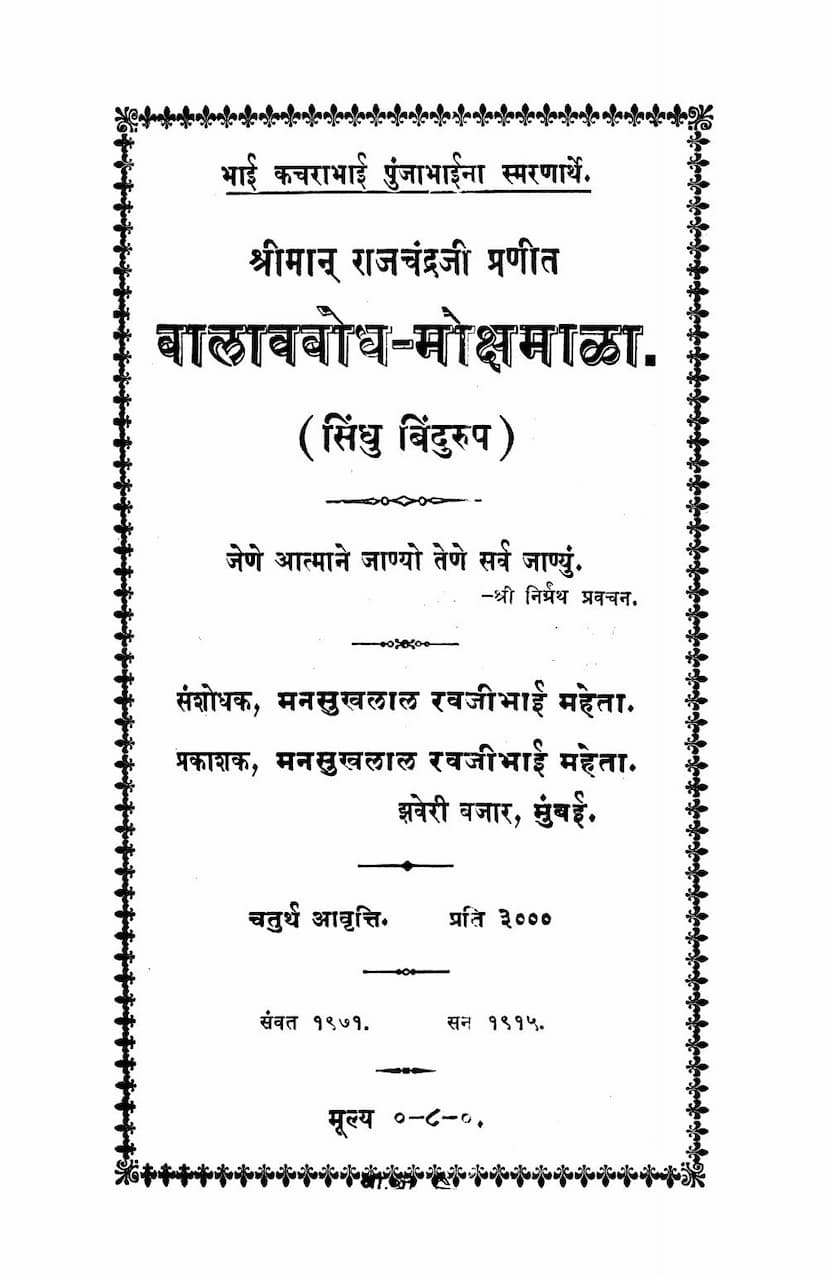Balavbodh Mokshmala
Added to library: September 1, 2025

Summary
Here's a comprehensive summary of the Jain text "Balavbodh Mokshmala" by Mansukhlal Ravjibhai Mehta, based on the provided catalog link and text content:
Book Title: Balavbodh Mokshmala Author: Shrimad Rajchandra (as the original author of Mokshmala), Mansukhlal Ravjibhai Mehta (as the compiler/publisher of this edition) Publisher: Mansukhlal Ravjibhai Mehta Edition: Fourth Edition Year: Samvat 1971 / 1915 CE Catalog Link: https://jainqq.org/explore/006234/1
Overall Purpose and Structure:
"Balavbodh Mokshmala" is presented as the first volume (Balavbodh) of a planned larger series by Shrimad Rajchandra on the path to liberation (Moksha). The series was envisioned to have three parts:
- Balavbodh (Introduction/Basic Understanding): This is the volume presented, intended for beginners and those in the initial stages of spiritual understanding.
- Vivechan (Elaboration/Detailed Explanation): This was planned for individuals at a more advanced stage.
- Prajnabodhan (Enlightenment of Wisdom/Philosophical Discourse): This was intended for advanced philosophical practitioners.
Tragically, Shrimad Rajchandra passed away at the young age of 32, preventing him from completing the subsequent volumes. This "Balavbodh" volume itself was intended to be further divided into two parts, with one section being even simpler for absolute beginners, making a total of potentially four books in the series.
Content and Themes:
The book is a collection of educational lessons (Shiksha Path) designed to impart fundamental Jain principles in an accessible manner. It aims to provide guidance on spiritual progress, ethical conduct, and understanding the core tenets of Jainism. The lessons cover a wide range of topics, including:
- The Nature of Reality: Discussions on the soul, karma, and the cyclical nature of existence (Samsara).
- Ethical Principles: Emphasis on virtues like truth, non-violence (Ahimsa), forgiveness, compassion, and righteous conduct.
- Spiritual Practices: Guidance on meditation (Samayik), penance, devotion, and the path to liberation.
- The Importance of Human Life: Highlighting the rarity and value of the human birth as the only means to achieve Moksha.
- Understanding Karma: Detailed explanations of how actions (karma) influence one's destiny and future rebirths.
- Role of a Guru: Emphasizing the importance of a qualified spiritual guide (Sadguru) for correct spiritual understanding.
- Detachment and Renunciation: Exploring the concept of detachment from worldly possessions, relationships, and desires, as exemplified by the story of Anath Muni.
- The Teachings of Shrimad Rajchandra: The book includes insights into Shrimad Rajchandra's personal spiritual aspirations and his views on the state of Jainism in his time, advocating for unity and a deeper understanding of principles over sectarian divisions.
- The Five Perfections (Pancha Parameṣṭhi): The significance of the Navkar Mantra and the virtues of the five supreme beings (Arhat, Siddha, Acharya, Upadhyaya, Sadhu) are discussed.
- The Twelve Reflections (Dvādaśa Anuprekshā): These reflections are presented as a means to cultivate detachment and spiritual insight.
- Discrimination between True and False Happiness: The book contrasts fleeting worldly pleasures with the eternal bliss of Moksha.
- The Significance of Jainism: The text strongly advocates for the superiority and comprehensive nature of Jain philosophy, particularly in its detailed understanding of the soul, karma, and liberation, in contrast to other religious or philosophical systems.
Key Figures and Influences:
- Shrimad Rajchandra: The spiritual inspiration and original author of the "Mokshmala" concept. He is highly revered for his profound spiritual insights, intellectual prowess, and early death at 32. His life is described as a testament to pure living and preaching.
- Mahavira: The central figure whose teachings form the foundation of Jainism.
- Various Jain figures: Stories and examples from Jain tradition are used, such as Anath Muni, Kamdev Shravak, Sudarshan Sheth, and Kapil Muni, to illustrate spiritual principles.
- Mahatma Gandhi: His admiration for Shrimad Rajchandra is cited, comparing him favorably to Tolstoy in terms of religious perception. Gandhi's letter from South Africa is mentioned, highlighting his appreciation for Shrimad's life and writings.
- Professor B.K. Thakore: Who considered Shrimad Rajchandra a "born ascetic."
- Mr. C. M. B. B. Malabari: A social reformer who lauded Shrimad Rajchandra's intellectual and memory powers.
Context of the Edition:
The fourth edition, published in 1915 CE, was made possible by the financial contribution of Shri Punjaabhai Hirachand in memory of his son, Kachrabhai Punjaabhai, who passed away at a young age. The preface acknowledges the growing popularity of the "Balavbodh" volume and its use in educational institutions.
Overall Message:
"Balavbodh Mokshmala" is a foundational text aimed at guiding individuals towards spiritual enlightenment. It emphasizes the importance of understanding Jain principles through thoughtful reflection (Manan) rather than mere rote learning. The book encourages a life of ethical conduct, detachment, self-awareness, and devotion to the path of liberation as taught by the Tirthankaras, particularly Mahavira, and expounded by Shrimad Rajchandra. It seeks to instill a deep understanding of the soul's journey and the means to break free from the cycle of suffering.